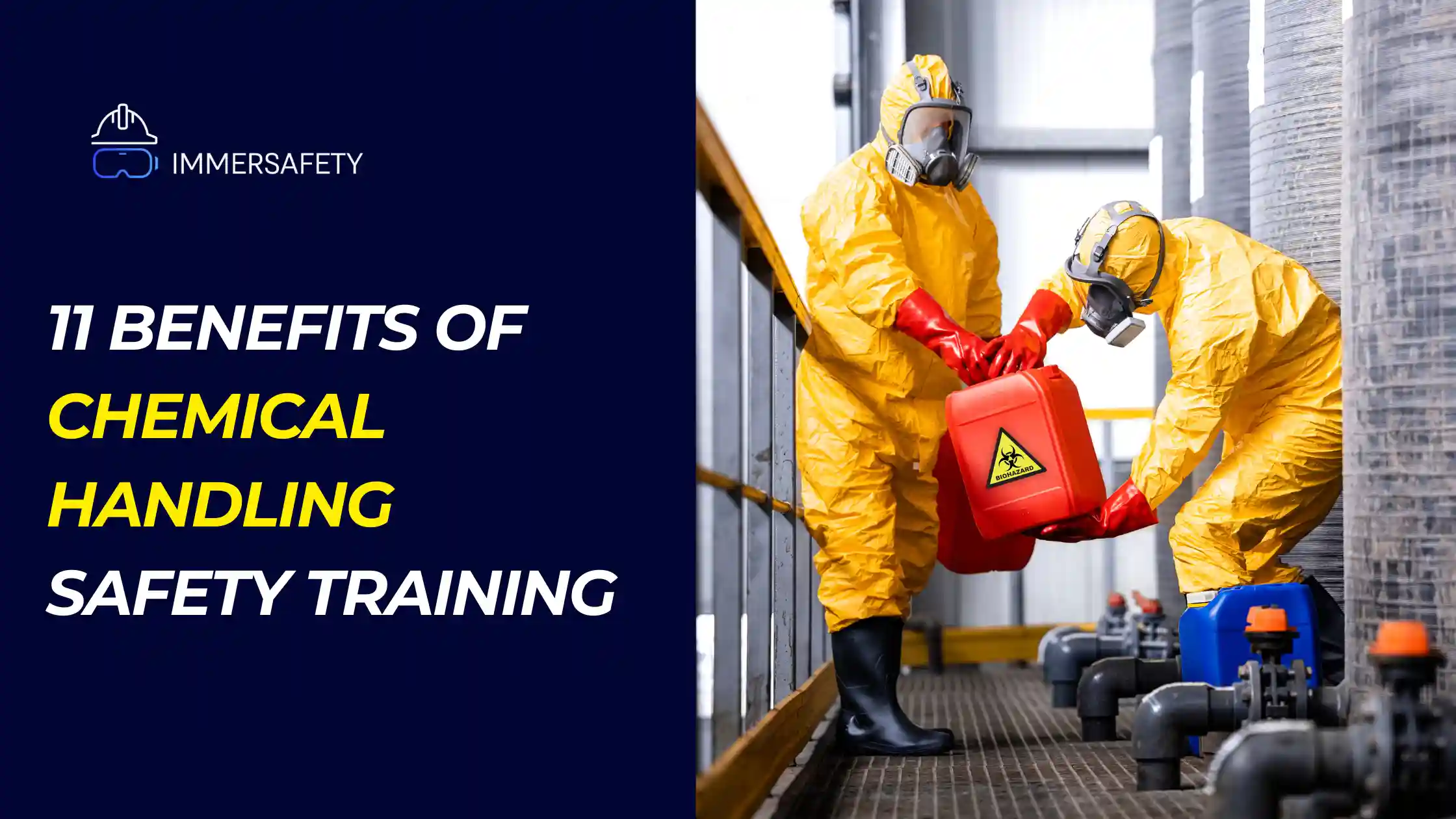In the realm of industrial operations, chemical handling is a critical area requiring meticulous safety protocols.
Effective safety training ensures that personnel are well-equipped to manage and manipulate hazardous chemicals safely, preventing accidents and maintaining workplace safety. This comprehensive guide explores the benefits of rigorous chemical handling safety training.
11 Benefits of Chemical Handling Safety Training
1. Enhances Knowledge of Chemical Hazards

Training provides workers with essential knowledge about the properties of various chemicals they handle. Understanding hazards associated with each chemical, including flammability, reactivity, and health risks, is crucial for maintaining safety standards.
See Our – VR Chemical Safety Training
2. Reduces Chemical Spills and Accidents

Proper training in chemical handling reduces the likelihood of spills and accidents. Trained employees are more proficient in using handling techniques that minimize risk, thus protecting themselves and their environment.
3. Ensures Proper Use of Personal Protective Equipment (PPE)

Safety training emphasizes the importance of PPE, teaching employees when and how to use items such as gloves, goggles, and respirators correctly. This reduces exposure to harmful chemicals.
4. Promotes Compliance with Safety Regulations
Safety training helps ensure that your organization complies with local and international safety standards and regulations. This compliance not only reduces the risk of legal issues but also establishes your company as a responsible entity.
5. Improves Emergency Response
In the event of a chemical emergency, a well-trained team can respond more swiftly and effectively. Training covers emergency procedures, including evacuation routes, first aid, and spill containment.
6. Increases Efficiency and Productivity
Efficient handling of chemicals, facilitated by proper training, leads to smoother operations. Employees are less likely to commit errors that can cause work interruptions, leading to higher productivity.
7. Enhances Employee Confidence
When employees are confident in their abilities to handle chemicals safely, it enhances their overall morale and job satisfaction. They are less anxious about potential accidents, knowing they have the training to handle situations correctly.
8. Reduces Health-Related Absences
Proper chemical handling reduces the risk of exposure to harmful substances, leading to fewer health-related absences among employees. This benefit extends to reducing potential long-term health care costs.
9. Protects the Environment
Training in safe chemical handling includes instructions on how to prevent environmental contamination. This is vital for companies committed to sustainability and environmental stewardship.
10. Supports a Culture of Safety
Regular training reinforces a safety culture within the organization. It emphasizes the company’s commitment to safety and encourages employees to be vigilant and proactive about their environment.
11. Enhances Company Reputation
A strong record of safety enhances a company’s reputation. Stakeholders, including customers, investors, and regulatory bodies, view compliance with safety protocols favorably, impacting the business positively.
FAQ’s
What is chemical handling safety training?
Chemical handling safety training educates workers on the proper procedures for handling, storing, and disposing of chemicals safely to prevent accidents and ensure compliance with regulations.
Why is chemical handling safety training necessary?
This training is crucial to prevent workplace accidents, ensure health and safety compliance, protect the environment, and minimize the risk of costly disruptions due to chemical spills.
Who should undergo chemical handling safety training?
Any employee who stores, uses, or disposes of chemicals should receive this training, including staff in industries like manufacturing, healthcare, research, and construction.
How often should chemical handling safety training be conducted?
Training should be conducted regularly, especially when new chemicals are introduced, when new processes are implemented, or when regulations change. Many organizations conduct annual refresher courses.
What are the key components of effective chemical handling safety training?
Effective training should cover chemical hazard identification, correct use of personal protective equipment, emergency procedures, spill containment methods, and proper storage and disposal techniques.
Conclusion
Investing in chemical handling safety training offers extensive benefits ranging from enhanced personal safety to broader compliance and productivity gains. Organizations should prioritize ongoing training programs to maintain high safety standards and protect their workforce, the public, and the environment.


